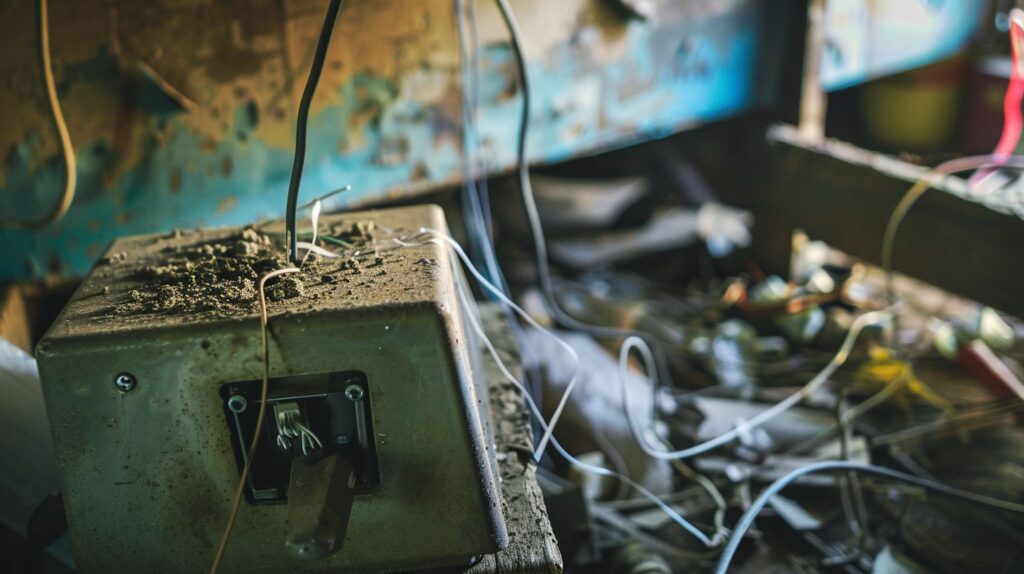Have you ever felt a slight shock when touching an appliance? This common issue signals a problem with electrical grounding. Our blog explains how grounding acts as a safety net, directing unwanted electricity away from you and into the earth.
Stay safe, keep reading.
Key Takeaways
- Grounding keeps you safe from electric shocks by sending stray currents into the earth instead of through your body.
- It protects your devices from getting damaged by power surges, ensuring they last longer and work better.
- Grounding reduces the chance of electrical fires by providing a path for excess electricity to safely leave the system.
- Proper grounding makes electrical systems more reliable, preventing interference that can mess up how well your electronics work.
- Following National Electric Code guidelines for grounding is key to keeping people and their equipment safe.
What is Electrical Grounding?
Moving from the basics, we now focus on electrical grounding. This process connects a conductor from your circuit breaker box to the earth. It makes sure excess electricity has a safe path back to the ground.
Think of it as making your electrical systems more reliable and safer.
Electrical grounding uses things like grounding wires and rods to make this connection strong. These tools help control sudden surges like lightning strikes or short circuits. They direct harmful currents away from your devices and into the soil, where it’s harmless.
Grounding is key for safety in homes and workplaces—it keeps people and expensive equipment away from danger.
Importance of Electrical Grounding
Electric grounding is vital as it eliminates the risk of electrical shock, prevents equipment damage, reduces the risk of electrical fires, improves the reliability of electrical systems, and reduces electrical noise.
It ensures safety standards are met by protecting people from harm and safeguarding electrical equipment.
Eliminates Risk of Electrical Shock
Grounding provides a safe path for stray current to follow, instead of passing through a person. This key step keeps everyone safe from electric shocks. Ensuring proper grounding at outlets is crucial in homes and workplaces.
It acts like a safety net, catching hazardous currents and directing them into the earth. This process significantly lowers the chance of getting shocked.
Licensed electricians use grounding electrodes and conductors to set up grounding systems. These systems protect people by ensuring that fault current does not cause harm. Ground wires play a big role here.
They make sure electricity has somewhere safe to go if something goes wrong in the wiring or devices like power strips and surge protectors.
Prevents Equipment Damage
Grounding provides a safe path for electricity. This keeps sensitive devices like computers and TVs safe from power surges. Without grounding, these surges could cause harm to the electronic parts inside your equipment, leading to costly repairs or replacements.
It acts much like a lightning rod during a storm, directing excess energy away into the earth rather than letting it flow through your devices.
Proper grounding protects expensive electronic equipment and ensures that electrical systems run smoothly. For instance, grounding helps prevent the buildup of static electricity which can damage electronics and data storage units within dense computing environments such as laboratories or data centers.
It is essential in maintaining the longevity and reliability of electrical installations by minimizing risks associated with overvoltages.
Grounding serves as critical insurance against unexpected electrical events that could otherwise result in significant damage or total loss of valuable electronic systems.
Reduces Risk of Electrical Fires
Electrical fires start when too much current flows through wires not made to handle it. This can heat the wires and ignite things nearby. Grounding creates a safe path for extra current to travel back to the earth, instead of building up in the power system where it can cause harm.
By installing grounding systems according to the national electrical code, electricians make homes safer from fires.
Proper grounding means fewer sparks and less overheating in electrical systems. Sparks often lead to fires when there is no safe way for excess electricity to escape. Equipment like circuit breakers and fuses work with grounding to stop overflow before it turns into a spark or fire.
These safety devices detect too much current and cut off power quickly, but only if they’re grounded right. So, careful installation keeps people and their homes safe from unexpected flames caused by electrical faults.
Improves Reliability of Electrical Systems
After ensuring safety against fires, grounding plays a crucial role in boosting the performance and reliability of electrical systems. Grounding offers a low-resistance path back to the earth, making electric currents flow safely.
This limits electromagnetic interference which can mess with other devices connected to the same power supply. In simpler terms, grounding keeps everything working smoothly without unwanted noise or interruptions.
Grounded systems are less likely to have problems like static discharges or ground loops that can harm electronic schematics. For electricians, this means fewer emergency calls for equipment malfunctions and more stable energy systems.
By connecting solar panels, wind turbines, and other renewable sources firmly to the ground, we ensure that clean energy flows reliably into our homes and businesses every day. This makes grounded electrical networks not just safer but also more efficient and dependable for everyone involved.
Reduces Electrical Noise
Electrical grounding cuts down on electrical interference, or “noise,” that can mess up the performance of your devices. This noise often comes from the power grid or internal sources within a building’s own electrical system.
By connecting the electrical system to earth ground, grounding acts like a filter. It gets rid of unwanted signals and stabilizes the voltage levels across your devices. This makes sure electronic devices work properly and last longer.
Grounding also improves safety by reducing shock hazards around power outlets and electrical equipment. It provides a path for stray voltage, caused by faults in the system, to safely return to the ground without causing harm.
Ground fault circuit interrupters (GFCIs) are key tools here. They quickly cut off power if they detect an imbalance, preventing shocks before they happen.
A well-grounded system is safer and ensures smoother operation of all connected electronics.
Safety Benefits
Electrical grounding offers crucial safety benefits. It safeguards people and protects electrical equipment from harm.
Protecting People from Harm
Grounding keeps people safe from electric shock. It makes sure that if a fault happens, the electricity will go into the earth instead of through someone’s body. This is key to avoiding serious injuries or even death caused by electrical currents.
For homes, grounding and bonding correctly are crucial steps in making sure these dangers stay low.
Keeping electrical tools and wiring properly grounded also stops power outages and equipment damage. Since electricity seeks the shortest path to ground, having a secure path reduces risks greatly.
This safety measure follows national codes like NEC, ensuring every home stays safe from unexpected electrical harm.
Safekeeping of Electrical Equipment
Grounding protects sensitive electronic devices from damage. This practice ensures that extra electricity finds a safe path into the ground. It keeps electrical systems running smoothly and prevents costly repairs or replacements.
For electricians, grounding is part of routine maintenance that helps in the longevity of equipment.
Following national electrical codes during installation shields devices against unpredictable surges. Using proper grounding techniques also means fewer emergency calls for damaged circuits and electronics.
Next, we will explore legal and compliance aspects, highlighting how adherence to regulations keeps people safe and safeguards the environment.
Legal and Compliance Aspects
Adherence to electrical codes and regulations is essential for ensuring safety standards in all electrical installations. It’s important to understand the legal requirements and compliance aspects related to electrical grounding for a safe and secure working environment.
Adherence to Codes and Regulations
Grounding electrical systems is a must, as per the National Electric Code (NEC). This code sets the standard for safe grounding to protect people and equipment. Electricians need to follow these guidelines closely.
They ensure that every electrical panel grounds properly. The NEC updates often, so staying informed is crucial.
Countries around the world require grounding for both safety and legal reasons. Electrical work that meets these standards prevents accidents and complies with law. It’s about keeping everyone safe from electrical shocks and fire hazards.
Safety isn’t expensive, it’s priceless.
Ensuring Safety Standards
Adherence to codes and regulations sets the foundation for safety in electrical systems. Proper grounding is crucial to prevent hazardous situations, protecting people from harm and avoiding equipment damage.
Utilizing quality materials resistant to rust and corrosion enhances the reliability of electrical systems, ensuring that safety standards are met. Regular inspections play a pivotal role in upholding these standards, preventing emergencies and securing sustainable environments.
By adhering to codes and regulations electricians can ensure safety standards are met with expertise. As grounded systems reduce risk of fires by 50%, it’s essential for environmental protection endeavors through recycling programs[i].
Adhering to international electrotechnical commission (IEC) specifications guarantees environmentally friendly practices[ii], safeguarding ecosystems from potential damage caused by faults in electrical currents[iii].
Furthermore, proper grounding aids in reducing electrical noise within power distribution networks[iv], making a significant impact toward ensuring safety standards[v].
[i] Source: Environmental Protection Agency
[ii] Source: International Electrotechnical Commission Standards
[iii] Source: National Ecosystem Services Partnership
[iv] Source: IEEE Transactions on Power Delivery
[v] Statistical data supported by NFPA 70 National Electrical Code
Environmental and Future Considerations
Grounding systems play a crucial role in protecting the environment and supporting future energy needs. They are vital in the development of renewable energy systems, making them an essential consideration for environmental sustainability and future technological advancements.
Environmental Protection
Grounding significantly reduces environmental impact by preventing lightning-caused fires. Proper grounding safeguards renewable energy systems, thereby preserving natural resources and minimizing ecological harm.
This essential practice not only ensures safety but also plays a crucial role in protecting the environment from potential electrical hazards such as fires and damage caused by fault currents.
By incorporating effective grounding methods when installing electrical systems, electricians actively contribute to environmental preservation and sustainability.
Additionally, implementing proper grounding techniques contributes to reducing the risk of electrical fires triggered by lightning strikes or other high-voltage events, which can have detrimental effects on the surrounding environment.
In essence, conscientious attention to grounding practices serves as an integral aspect of environmental protection within the realm of electrical safety and infrastructure development.
Grounding in Renewable Energy Systems
Incorporating proper grounding in renewable energy systems is vital for ensuring their efficiency and safety. By adhering to grounding protocols, such as using grounding conductor rods and properly connected ground potential, the risk of electrical hazards and damage to equipment is substantially reduced.
In addition, it plays a crucial role in protecting the environment by minimizing the impact on renewable energy systems.
Moreover, with the increasing focus on sustainable energy sources like solar and wind power, understanding how to effectively ground these systems is essential for electricians. This knowledge ensures that such renewable energy infrastructures remain reliable, systematically structured, and safe from potential environmental damage leading to a secure energy supply for future generations.
Next Sub-Heading: “Professional Guidance and Installation
Professional Guidance and Installation
For expert-level help and reliable installation, seek professional electricians. Their expertise ensures safe and efficient electrical grounding systems.
Importance of Expert Installation
Expert installation is crucial for ensuring safe and reliable power systems in sheds. Professional electricians design well-planned systems to protect against hazards like electrocution, ensuring the safety of both people and electrical equipment.
Additionally, professional installation of in-ground electrical junction boxes safeguards against potential dangers and guarantees system reliability.
Moving on to the next section, let’s dive into how expert guidance benefits safety measures when dealing with electrical grounding.
When to Seek Professional Help
- Seek professional help to assess and rectify complex grounding issues, such as corroded grounding conductors, and high voltage risks.
- Professional guidance is crucial for intricate installations, like those in renewable energy systems, where adherence to legal codes and regulations is paramount.
- Engage professional electricians when dealing with intricate electrical schematics and the complexities of HVAC systems in industrial settings.
- Seek specialized assistance for large-scale projects involving utility grids and construction sites to ensure compliance with safety standards.
- Rely on licensed electricians to navigate the ever-evolving realm of electrical engineering, particularly in the installation and maintenance of grounding electrode conductors for optimal system reliability.
Conclusion
Electrical grounding is crucial for safety as it prevents electric shock, reduces fire risk, and protects sensitive equipment. It provides a safe pathway for excess electrical current to flow back to the earth, ensuring safe discharge and reducing harm.
Grounding also improves electrical system performance and reliability by limiting interference or “noise.” Following National Electric Code (NEC) guidelines is essential in proper grounding that protects people and equipment from various electrical hazards.
Seek professional help for the installation of grounded electrical systems to comply with building codes and ensure safety measures are met.


